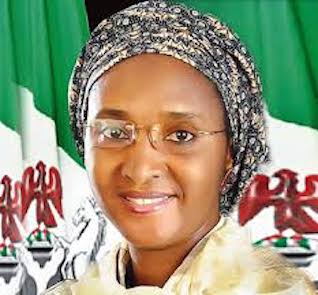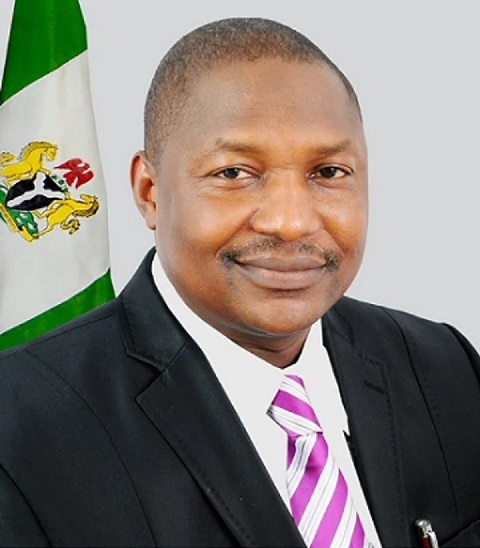COVER
Ahmed Pledges Support to End Violence Against Women

By Tony Obiechina, Abuja
The Minister of Finance, Budget and National Planning, Mrs Zainab Ahmed has pledged the Ministry’s support to the efforts of her Women Affairs and Social Development counterpart to end violence against Women and Girls.
Ahmed pledged at the National Accountability Town Hall Meeting to commemorate the 2020 16 Days of Activism to end Violence against Women and Girls with the theme “Orange the world, Fund, Response, Prevent and Collect” held in Abuja at the weekend.
The Minister who lamented that the COVID -19 pandemic has heightened the gravity of violence and sexual abuse against women and girls, noted that a recent EU report shows that the 30% of women aged 15 – 49 had experienced sexual abuse at one time or the other.
According to her, another report commissioned by the Ministry of Women Affairs and the United Nations Population Commission in support of Norwegian government also showed that 28% of Nigerian women between the age of 25-29 have experienced some form of violence at one time or the other.
Mrs. Ahmed stated that in response to the rising cases of violence against women, President Buhari inaugurated an Inter-ministerial committee on the eradication of sexual and gender based violence against women, adding that state governors had unanimously declared a State of Emergency on this.
Her words, “The safety and economic empowerment of women and girls is critical to our country’s development.
“Not only must every woman and girl be safe in their respective homes, communities, and places of work, they must all be given the opportunities and tools with which to be socially, financially, and economically empowered”.
According to her, women continue to be vulnerable and at risk, and as global and domestic data have shown, women have disproportionately borne the impact of the COVID-19 pandemic – on the frontlines, in their homes, and across various sectors.
“This is against the backdrop of recent human capital and gender parity indices which provide a sobering reality – that we have a long journey ahead when it comes to achieving gender equality,” she said.
“It is, therefore, imperative that governments, and particularly those in Africa, prioritise the empowerment and advancement of women in all spheres of society, and specifically in areas relating to their socio-economic wellbeing.
“This is especially significant given the emerging data demonstrating the impact of representation, and of women being in positions of leadership and being decision-makers”, the she noted.
Continuing, the minister said, “Considering that many countries are facing fiscal constraints and low revenues post COVID-19, it is important for us to develop new and scale existing interventions at the intersection of gender and fiscal policy/public financial management.
“Such interventions include gender responsive budgeting, and assessments of the gender responsiveness of key fiscal interventions (including fiscal stimulus packages) with specific commitments aimed at improving the safety, livelihoods, and economic status of women and girls.
“Such a focus ensures sustainable and scalable change. This is an area in which we at the Ministry of Finance, Budget and National Planning will be focusing more deliberately, particularly in the post COVID-19 reality.
According to her, in order to ensure the sustainability of programmes and interventions, “it is critical that we take a long term and strategic approach to establishing gender parity, and ensuring that women are safe and economically empowered, resulting in a stronger economy overall.
“We are working to ensure that our public financial management processes are more gender-sensitive, and that credible data is made available and is disaggregated along gender lines to ensure that finances are reaching the intended beneficiaries.
“To further address issues of gender responsiveness in our fiscal interventions, I plan to convene a High-Level Policy Dialogue Session with government, development partners and other stakeholders, to harvest inputs and facilitate prioritisation of gender-focused interventions in the fiscal and public financial management space
“Additionally, we will explore how to strengthen gender-responsiveness through the implementation of tools such as gender responsive budgeting and other interventions along the public financial management life cycle. These steps will help us mobilise and be efficient in how we use the funding required to address and prevent gender-based violence”, she added.
In her address, Minister of Women Affairs, Dame Pauline K. Tallen, noted that gender-based violence (GBV) remains one of the most serious threats to the health and safety of women and girls worldwide.
According to her, the devastating consequences, are felt at all levels including social, economic and personal because of the grievous harm inflicted on victims.
“In spite of existing laws and policies on GBV in Nigeria, such as the Violence Against Persons Prohibition Act, 2015 and the Child Rights Act, 2003, these vile acts still persist.
“Violence against women and girls are widespread as a result of gender inequality due to patriarchy, imbalance in socio-economic opportunities, cultural and religious factors and inadequate enabling legal and policy frameworks, among other factors”.
Tallen further noted: “There is also a growing evidence to demonstrate that preventing violence can promote economic growth, human dignity, a just and egalitarian society”.
She said according to the UN report on GBV in Nigeria during the COVID-19 crisis, there is a general increase in GBV across all the six (6) geo-political zones and service providers have reported sharp increases in cases of intimate partner violence and domestic violence.
According to her, in spite of these incidents, “the present administration, under the leadership of President Muhammadu Buhari, has truly demonstrated high commitment not only to eliminate harmful practices against women and girls, but also to curb the rampaging impact of COVID-19 pandemic and other GBV, which erupted in the wake of measures put in place to flatten the curve of the pandemic.
“This has made governments at all levels to respond positively to the national outcry that trailed the unacceptable trends and patterns witnessed in the last few months,” she further said.
COVER
DAILY ASSET Appoints Torough, Editor, Names Eze, Deputy

By Laide Akinboade, Abuja
As part of efforts to reposition the newspaper for optimum corporate performance, the management of Asset Newspapers Limited, Publishers of DAILY ASSET, has announced the appointment of David Torough as the Editor of the Abuja-based national daily.
A statement by the management said the appointments were part of the company’s new strategy to further penetrate the various states in the country and raise its readership and patronage.
“DAILY ASSET is widely acceptable across the country and to maintain our leadership position, we need to increase management presence, hence the need to create new Bureau offices in some locations outside Abuja and Lagos,” the statement quoted the Publisher/ Editor-in-Chief, Dr Cletus Akwaya to have said.
In a statement yesterday, Publisher and Editor-in-Chief of the fast-growing daily, Dr. Cletus Akwaya said the appointment was part of the new strategy to properly situate the paper for better productivity.
“DAILY ASSET has a commitment with the Nigerian people. We are determined to weather the storm and give Nigerian readers a Newspaper that satisfies their yearnings and reading pleasure and we can only do that with the right set of professionals,” the statement said.
Akwaya, a former Commissioner of Information from Benue State said the difficult times being faced by Nigerians posed a great challenge to the media as the people deserved credible information with which to make choices.
“We have a bond with the people, to offer credible information at all times in the best tradition of the Nigerian Press and on this scale of objectivity, truth and fairness, we pledge to remain steadfast no matter the challenges,” Akwaya was quoted to have said.
He said the newspaper will maiantin its daily print run and circulation to all states of the federation and urged advertisers to take advantage of the deep penetration of the Daily Asset brand to send their messages.
Torough, the new Editor has had a steady rise in the Newspaper in the last five years.
A graduate of Mass communication of the Benue State University, Makurdi, Torough joined the company in 2022 as Benue State Correspondent. He was spotted for his brilliance and redeployed to Abuja the following year and promoted to Deputy News Editor. He was subswuently named Deputy Editor of the paper, a position he held until the recent appointment.
Torough has attended several journalistic workshops and trainings to properly equip himself for the task ahead.
The statement also said the Management named Eze Okechukwu as Deputy Editor.
Before his elevation as Deputy Editor, Eze has been Deputy Politics Editor and DAILY ASSET Newspaper correspondent covering the Senate, having joined the organization in 2021.
Born on March 10, 1975, Eze holds a Masters Degree in Mass Communication from the Enugu State University of Science and Technology.
Eze began his journalism career with Daily Star, Enugu and later worked with Daily Trust Newspaper, Abuja as sports reporter.
Aside from his journalistic excellence, he has a great deal of passion for sports.
COVER
Insecurity: Northern Govs, Monarchs Seek Six-month Mining Suspension

From Ngutor Dekera, Kaduna and Aliyu Askira, Kano
Northern governors and traditional rulers yesterday called for the suspension of mining activities across the region for six months, blaming illegal mining for worsening insecurity in many states.The resolution was contained in a communiqué issued after a joint meeting of the Northern States Governors’ Forum and the Northern Traditional Rulers’ Council held at the Sir Kashim Ibrahim House, Kaduna.
The meeting, chaired by the Gombe State Governor and NSGF Chairman, Muhammadu Yahaya, had in attendance the 19 northern governors and chairmen of the 19 states’ traditional councils. The Forum expressed concern over the escalating violence in parts of the North, including the killings and abductions recently recorded in Kebbi, Kwara, Kogi, Niger, Sokoto, Jigawa and Kano states, as well as renewed Boko Haram attacks in Borno and Yobe.“The Forum extends its deepest condolences and solidarity to the governments and good people of the affected states,” the communiqué said, noting that the attacks on schoolchildren and other citizens had become “unacceptable tragedies” that required urgent collective action.It commended President Bola Tinubu for what it described as the Federal Government’s “firm response” to recent abductions and insurgency threats, especially the rescue of some abducted pupils.The governors also saluted security agencies for their sacrifices on the frontlines.“We resolved to renew our support for every step taken by the President and Commander-in-Chief to take the fight to insurgents’ enclaves in order to end the criminality,” the Forum stated.A major highlight of the meeting was the North’s renewed push for the establishment of state police, with governors and traditional rulers insisting that decentralised policing had become inevitable.“The Forum reaffirms its wholehearted support and commitment to the establishment of state police,” the communiqué added, urging federal and state lawmakers from the region to “expedite action for its actualisation.”On illegal mining, the governors said criminal mining networks were fuelling violence and providing resources for armed groups.As a corrective measure, they asked Tinubu to direct the Minister of Solid Minerals to impose a six-month suspension of mining activities in order to allow for a full audit and revalidation of licences.“The Forum observed that illegal mining has become a major contributory factor to the security crises in Northern Nigeria. “We strongly recommend a suspension of mining exploration for six months to allow proper audit and to arrest the menace of artisanal illegal mining,” it said.To strengthen the fight against insecurity, the governors also announced the creation of a regional Security Trust Fund.Under the proposed arrangement, each state and its local governments will contribute ₦1bn monthly, to be deducted at source under an agreed framework.They said the fund would help provide sustainable financing for joint operations, intelligence-driven interventions and coordinated security responses across the region.At the end of the meeting, the Forum reaffirmed its commitment to unity and collective responsibility.“Only through unity, peer review and cooperation can we overcome the pressing challenges before us,” it declared.The Forum agreed to reconvene on a date to be announced.Meanwhile, Nigeria’s worsening security crisis took a grim turn on Monday as bandits launched fresh attacks in Kano State, abducting 25 villagers, even as the Federal Government raced to secure the release of more than 300 Catholic school children kidnapped in Niger State.In the early hours of Monday, armed bandits invaded Unguwar Tsamiya—popularly called Dabawa—in Shanono Local Government Area of Kano State, whisking away nine men and two women after shooting into the air and assaulting residents. The attackers also rustled two cows.A resident lamented the community’s helplessness: “We cannot do otherwise; most of us cannot leave because we have nowhere to go. This is our place, our land and everything is here.”The assault came less than 24 hours after a similar attack on Yan Kamaye in Tsanyawa LGA, a community along the volatile Katsina border.In Niger State, National Security Adviser Nuhu Ribadu has assured distraught families of St. Mary’s Co-Education School, Kontagora that the more than 300 students and staff abducted on November 21 will return home “soon.” Ribadu, who led a high-level federal delegation to the school on Monday, said the abductees are safe, though he offered no specifics on their location or the status of rescue operations.According to Daniel Atori, spokesman for the Catholic bishop overseeing the school, the NSA reassured officials: “The children are where they are and will come back safely.”The St. Mary’s attack is part of a worrying resurgence of mass kidnappings reminiscent of the 2014 Chibok schoolgirls’ abduction. Security analysts warn that banditry has evolved into a “structured, profit-seeking industry,” with hundreds of Nigerians abducted in November alone.The Kontagora school abduction occurred the same week 25 girls were kidnapped in Kebbi State—victims who authorities say have since been rescued through “non-kinetic” means. About 50 of the St. Mary’s hostages have also managed to escape.Ribadu’s delegation, which included the Minister of Humanitarian Affairs and the Director-General of the Department of State Services (DSS), reaffirmed the government’s commitment to securing the freedom of all abducted citizens.As communities from Kano to Niger continue to bear the brunt of these violent incursions, the escalating spate of kidnappings underscores the urgent national demand for a more decisive and coordinated security response.COVER
Abacha Loot Probe: Malami Faces EFCC Panel Daily in December

By David Torough, Abuja
The Economic and Financial Crimes Commission (EFCC) said former Attorney‑General of the Federation and Minister of Justice, Abubakar Malami, will face a team of interrogators at its office daily throughout December.A credible source in the EFCC said on Monday that the daily appearance was part of an ongoing investigation into the whereabouts of an alleged 490 million dollars Abacha loot secured through a Mutual Legal Assistance (MLAT) request.
The source said that Malami, who was summoned for interrogation by the EFCC on Saturday, was barred from leaving Nigeria for the next one month.According to the source, one of the conditions for his release on Saturday was that he should report daily to the EFCC Headquarters in Abuja for further interrogation.The source said Malami would have to appear daily at the anti-graft office due to the volume of the investigation and the seriousness of the charges against him.”We seized his passport, it is the normal routine during investigation, but he has to report at the EFCC headquarters in Abuja every day for the next month.”He will be reporting for further investigation throughout December.”He will be reporting every day, starting from Dec. 1st to Dec. 31st.He will appear before the team of investigators for the entire month of December.”He will be reporting to EFCC for investigation for the period because of the volume of the investigation and the seriousness of the charges against him,” the source added.According to the source, a fact sheet on the former minister revealed that Malami had several issues to clarify with the EFCC within the coming weeks.“We have asked him to explain the whereabouts of the $490 million Abacha loot secured through MLAT.“We didn’t say he stole money, but he should account for the loot. This is one of the issues he will clarify to our investigators.”The commission cited the large volume of documents he must review and the need for extensive interviews as reasons for seizing his passport.The source said EFCC would not engage in a war of words but would release its findings after a thorough investigation.Malami, in a statement by his media aide, Mohammed Doka, on Monday in Abuja, however, described the EFCC investigation as a political witch‑hunt.He confirmed he honored an EFCC invitation on Nov. 28, describing the engagement as fruitful and expressing confidence that the probe would vindicate him.Malami described the EFCC’s allegations as baseless, illogical and devoid of substance, insisting they collapse under factual scrutiny.





























